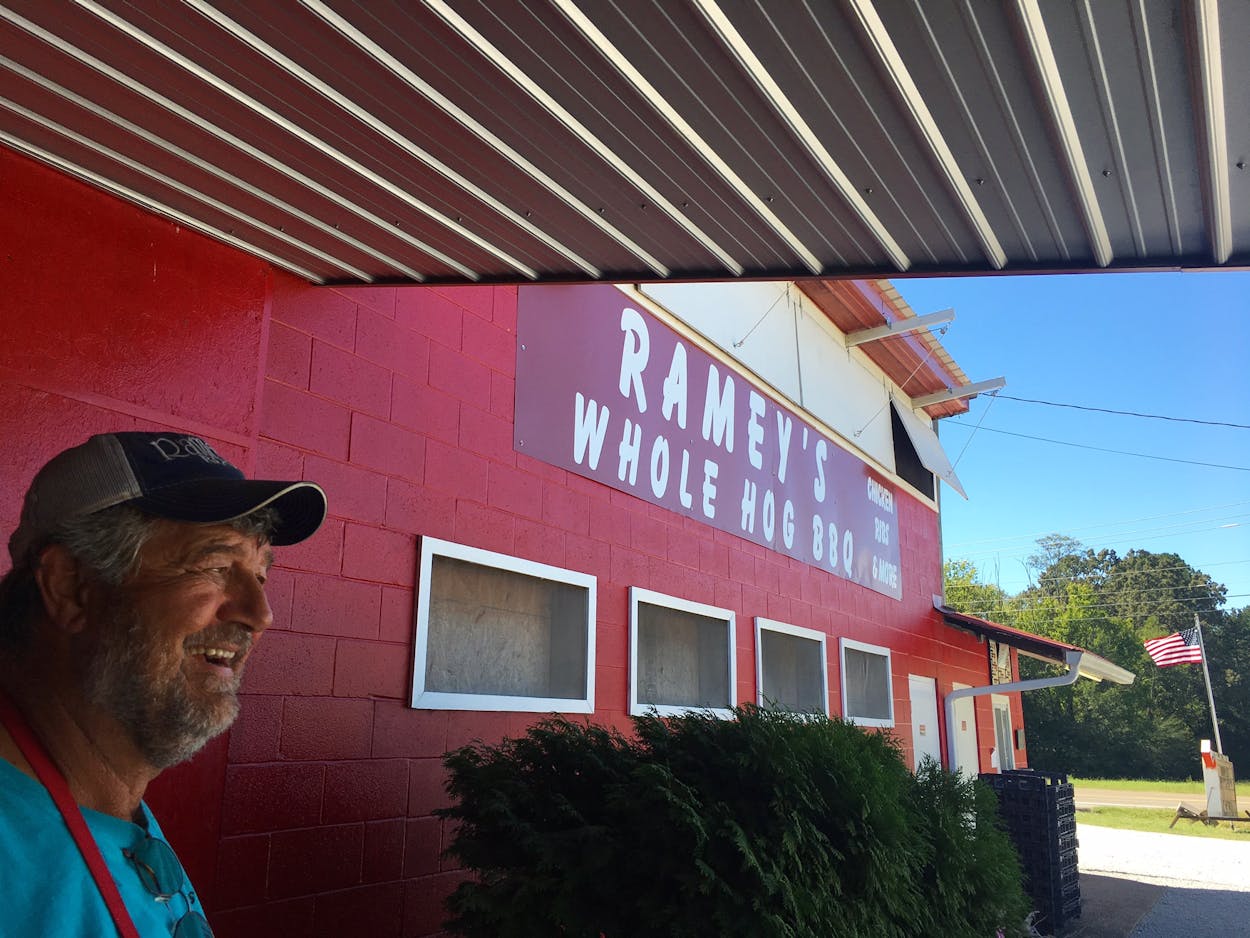Whole hog cooking used to be a way of life for small communities between Memphis and Nashville. These days, North and South Carolina are better known for this particular barbecue art form, but sizzling hogs over wood coals was thriving practice in Tennessee just a couple decades ago. Today, thanks to a lack of hog supply and the labor required for the cook, only three businesses in all of Tennessee still serve whole hog barbecue.*
According to the BBQ Hub, there are only 27 joints in the U.S. still smoking whole hog over wood. Six of those are locations of Martin’s Bar-B-Que Joint, which has four outposts throughout Tennessee and one in both West Virginia and Kentucky. I stopped in at the new downtown Nashville location of Martin’s, a multi-level barbecue palace with ping-pong tables and a stage for live music. Down in the kitchen, a fleet of rotisserie smokers churn out ribs, chicken, and even some respectable brisket.
But upstairs is the operation’s showpiece. A row of four steel-lined brick smokers sit beside the beer garden. Double doors, flung open wide, lead to the pit room, where onlookers shimmy their way in, cameras aloft, all the while hoping not to get shooed away by an angry cook. Instead, the pit hand welcomes them in with a smile as he seasons the cavity of a 180-pound hog. A fire rages inside a brick oven on one end of the room, making wood coals. Those will get shoveled into the pits throughout the day as the hogs slowly cook.
Owner Pat Martin could just as easily serve pork shoulders from one of his rotisseries, but he has a commitment to whole hog cooking. These pits serve as a visual guarantee that when they write “whole hog” on the menu, they mean it.
All the meat from the hogs is pulled and mixed with a peppery vinegar sauce. On Martin’s signature whole hog sandwiches, it is then topped with slaw. He nods in approval when I noted the topping’s importance. “It’s not a Tennessee barbecue sandwich without slaw,” he says as we tucked into the sandwich. The meat is juicy and smokier than most whole hog that I’ve eaten in the Carolinas. It’s a great sandwich.
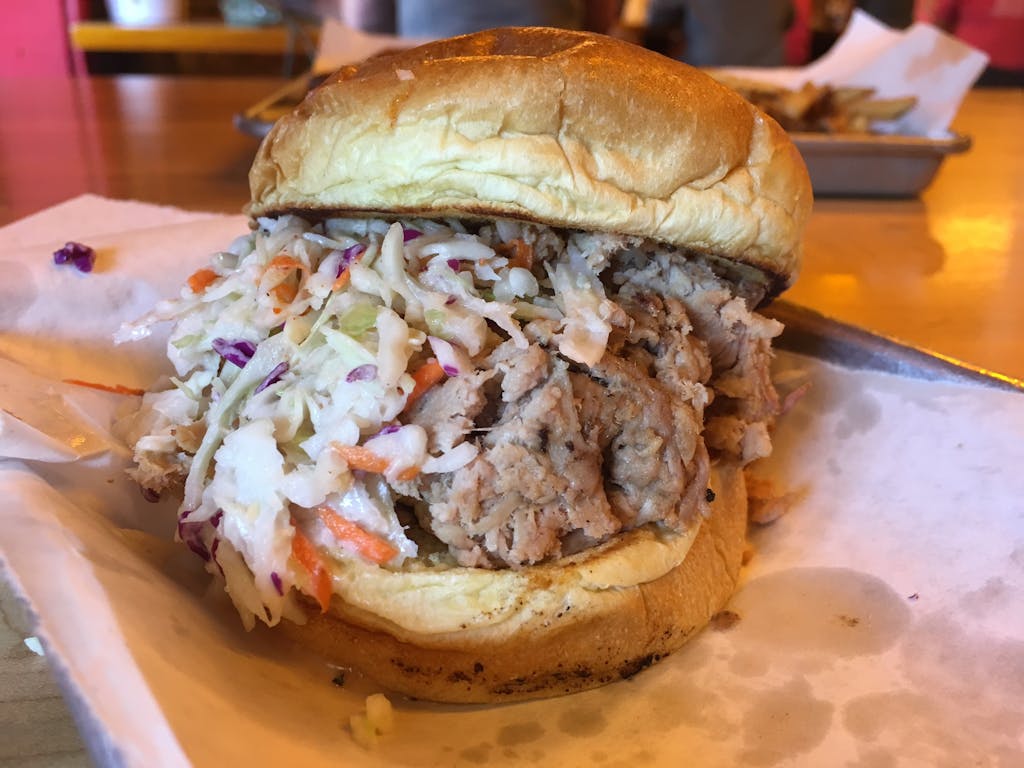
As Martin and I discussed some of the new barbecue joints that have opened in the booming city of Nashville, he pointed me instead to a road trip destination ninety minutes west of town. It was an easy sell. Ramey’s Whole Hog BBQ sits on the south side of Parsons, Tennessee, a tiny town fifteen miles south of I-40. The bright red building is just five miles from the Tennessee River, and the Ramey family resides along its banks. Daryl Ramey and his father and hog-cooking mentor, Douglas, opened the barbecue joint together in 1983. Douglas died of cancer about a year after they opened, barely having any time to enjoy his new El Camino, a car he’d always wanted. “He was just beginning to reap the benefits,” Daryl says, standing in his pit room alongside his son, Phil. They share cooking duties while Daryl’s wife, Joy, and their daughter, Candice, work the front. It’s truly a family business, but it’s not an easy one.
Whole hog barbecue is labor intensive. The Rameys burn hickory wood scraps from a nearby drumstick manufacturer down to wood coals in a brick oven outside. They tote shovel loads of coals through the swinging screen doors into the pit room, and deposit them next to one of several whole pigs. The process is repeated round the clock to keep the pit temperatures up. When enough coals have been deposited for a hog, a thick slab of cardboard from a local furniture store is placed over the top to hold the heat in—but not too much. “When you start closing them up with metal, you might as well put them in the oven,” Daryl says with a smirk. Open Thursday, Friday, and Saturday, they cook two or three hogs every day. At the height of their summer business, that number might jump as high as ten hogs, but the fall lull has already set in.
The Rameys close up shop completely in mid-December, and open back up the first week in March. It gives the family a break, but it also helps them sidestep a logistical hurdle. In the cold of winter, Daryl says, “I can’t keep hogs up to the temperature the inspector wants without burning them up.” Additionally, the increased amount of coals he needs to counteract the cold dries out the hogs, and he can’t afford to waste any pork.
Economic factors are one reason whole hog has fallen out of favor. Ramey can get whole pork shoulders for around $1.25 per pound. They’re easier to cook and have a better yield than whole hog, making them far more profitable. He pays just a dime less per pound for the whole pig, and can only serve about one-third of the weight of the carcass. But Ramey still needs to keep prices low. When I saw the $9 price tag on the menu, I thought it was a misprint—but that’s all it costs to get a pound of incredible whole hog barbecue in West Tennessee. “If you put it up to $10 per pound around here, your ass can go home,” Ramey explains. The locals wouldn’t stand for it, Ramey believes, but I’d argue they don’t have enough options for whole hog in the area to be picky.
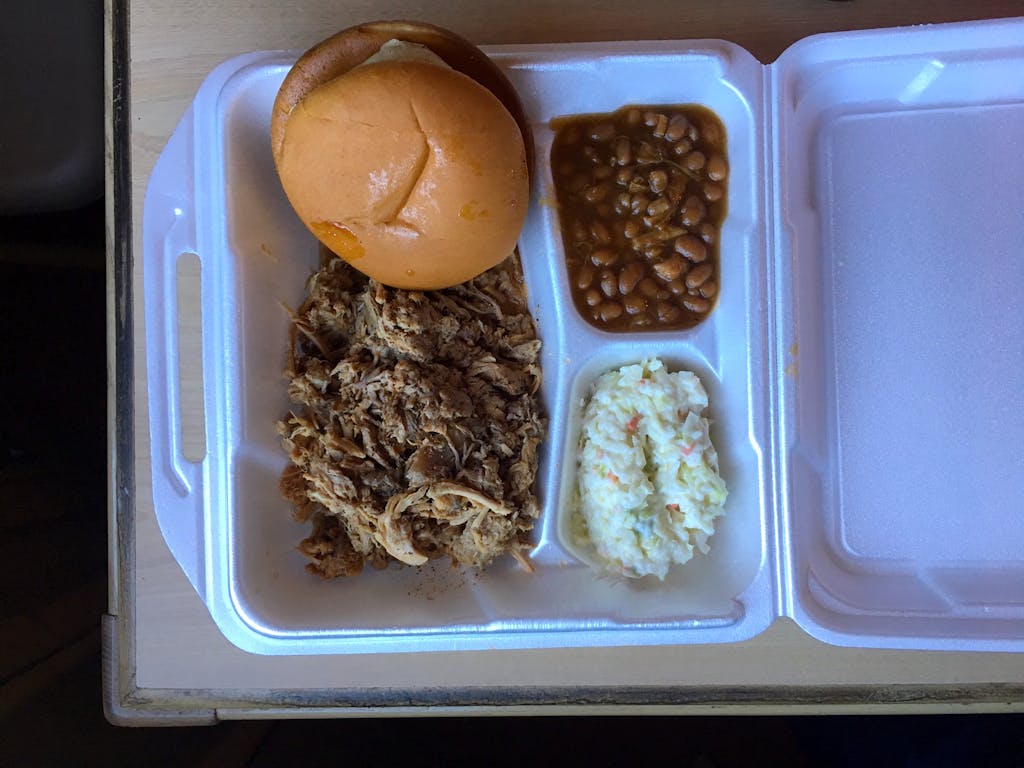
And increasingly, no one in Tennessee can be too picky about where they get their whole hog fix. Pat Martin learned to cook whole hog while in college at Freed-Hardeman University in Henderson, Tennessee. He logged hours in the pit room of Thomas & Webb Barbecue every chance he got, and one night in the spring of 1991, Harold Thomas let him handle his own hog. Martin was hooked, eating whole hog all over the area, including stops like Old Time BBQ and Jacks Creek BBQ. Martin left Henderson in 1994, assuming the whole hog tradition had some permanence. “There were nine barbecue joints that served whole hog [in Henderson],” he recalls. “Four of them were open six days a week.” Jacks Creek is still in operation, but now uses a Hickory Creek brand electric pig cooker. Chris Siler bought Old Time BBQ in 2007 (he renamed it Siler’s Old Time BBQ), with Ronnie Hampton was his pitmaster. They cooked whole hogs for a while, but switched to pork shoulders, and Hampton retired from cooking. Thomas & Webb closed, and Bills’s Bar-B-Que opened in its place in 2000. They abandoned the old pits and switched to electric cookers. Bill’s went to all shoulders about a decade ago. Liz’s BBQ was the lone holdout doing whole hog over wood coals in Henderson, but it closed last year.
“It was years ago when the hog market dried up around here,” Siler says. His switch from whole hog to shoulders (which still make for some fine barbecue from my experience at Siler’s) wasn’t an issue of cost, but one of supply. In order to cook whole hogs in a restaurant setting, the hogs need to be processed at a USDA inspected facility. And giant slaughterhouses turn their pork into cuts like hams, shoulders, and Boston butts, which are boxed up and shipped around the country. If you order pork from a distributor like Sysco, that’s what they’ll deliver. Whole hogs aren’t an option. Martin receives a steady supply of whole hogs from Fatback Farms in Alabama, which raises, slaughters, processes, and delivers the animals for Martin’s restaurants. He demands a lot of pigs, and therefore has the sort of buying power that can support an operation like that. Most other restaurants rely on smaller, local processing facilities that specialize in whole animals. There’s only one left in West Tennessee.
Southern Natural Farms, better known locally as 412 Meat Processing, sits along Highway 412, midway between Parsons and Lexington, Tennessee. They slaughter and process beef and all the hogs used by the only two barbecue joints still cooking whole hog over wood in West Tennessee: Ramey’s and Scott’s-Parker’s Barbeque in Lexington, only fifteen miles from Parsons. Scott’s-Parker’s opened as B. E. Scott’s Barbeque in 1962. Ricky Parker learned to cook hogs there from a young age, and eventually bought the place in 1989. He had a relentless work ethic and an impeccable reputation for whole hog cooking. When he passed away in 2013, his son Zach took over the pit duties. Thankfully, Scott’s-Parker’s Barbeque is still going strong.
When the Southern Foodways Alliance made a film about whole hog in 2005, they focused on West Tennessee. Ricky Parker was featured along with Ronnie Hampton, Jimmy Hopkins of My Three Sons Bar-B-Q, and Dennis Hays, who ran a barbecue joint and the processing facility where Southern Natural Farms is now. In the documentary, Hays described the area as a “hotbed of whole hog barbecue,” and said he supplied a dozen or more barbecue joints with hogs at the time. Parker, with his wit and one-liners, became the star of the film.
The film helped turn Scott’s-Parker’s Barbeque into the face of West Tennessee barbecue, and the well-deserved publicity followed. The Southern Food Aliance interviewed Ricky Parker and Zach in 2008. Since then, Munchies stopped in to make a film in 2015, and Scott’s-Parker’s made it into Southern Living‘s list of the 50 best barbecue joints in the country the following year. The One True Barbecue, a 2016 book about whole hog barbecue by Rien Fertel, featured Ricky Parker’s quest to cook 100 hogs in a single day (sadly, he passed away before he could attempt it). Eater brought their film crew out earlier this year, and Scott’s-Parker’s now has a barbecue sauce on the market. They’re a big name in the barbecue world.
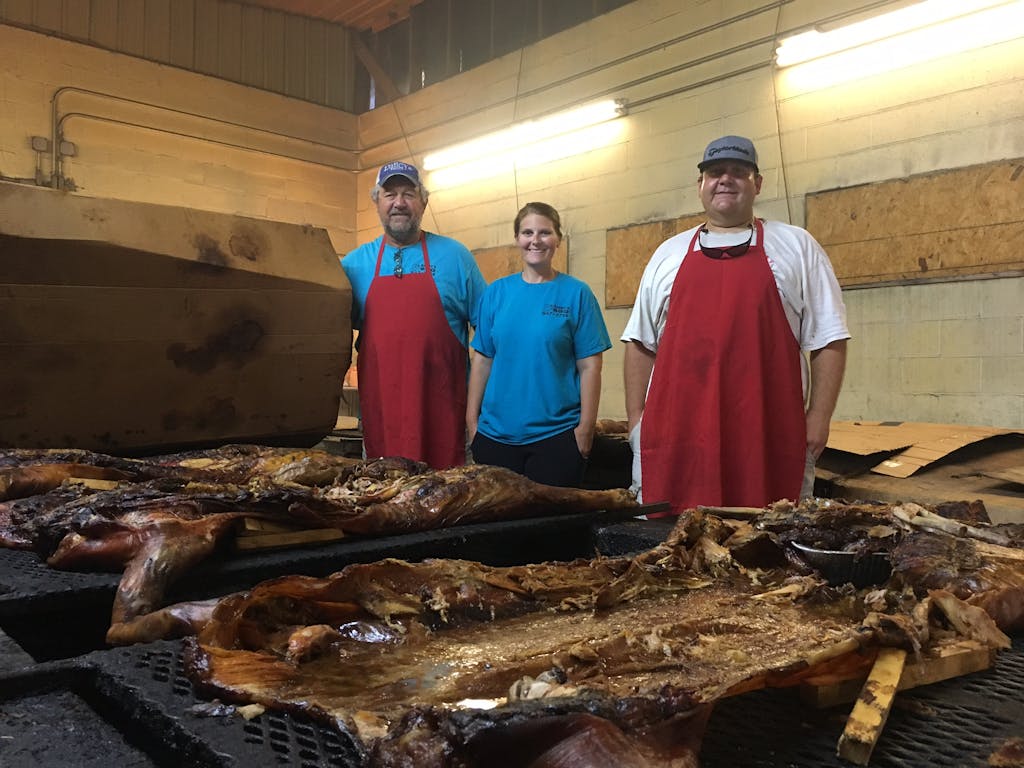
But I’d never even heard of Ramey’s Whole Hog BBQ, just fifteen miles away from Scott’s-Parker’s until Martin told me to visit—and I write about barbecue for a living. As one of the few remaining torch-bearers of a once thriving Tennessee barbecue tradition, their name belongs on a state-sponsored brochure or highway billboard. The Ramey family was stunned that I’d driven the 90 minutes from Nashville just to eat there, a short trip that should be a regular occurrence of any barbecue fan staying in either Nashville or Memphis. Toward the end of my two-hour visit, Daryl wondered aloud, “How can we get some recognition?” I’d usually tell a barbecue joint owner to stay the course and keep cooking good barbecue, but they’ve been doing that for 35 years. And in all that time they’ve never wavered from whole hog, and Daryl explained why: “If a man comes up to my window and wants middlins, I can give him middlins. If he wants shoulder, I can give him shoulder. If he says ‘give me two pounds of tenderloin,’ I can come back here and pull two pounds of tenderloin.”
I, however, simply ordered a plate at the walk-up window without specifying, which means I got a mix. I went with a friend, and we ate in the tiny dining room, which seats sixteen. Everyone else got their order to go, and that was plenty of folks. In a two hour span, there was always at least one person at the ordering window. Daryl said the explanation was simple. Besides Ramey’s and Scott’s-Parker’s, he says, “you can’t get whole hog nowhere.”
Ramey’s has added items like pork nachos and even barbecue pizza to the menu. (I assured them the title of the world’s only whole hog barbecue pizza was their’s alone.) Chicken is also on the menu, and ribs usually are too. They’re Phil’s specialty, but he had to stop cooking them. After throwing away six racks at the end of a recent weekend, he just couldn’t justify cooking baby backs the rest of the year. The $20 per rack price tag was too high for locals. Still, he’s excited to try again and get them back on the pits when they reopen next year after the winter break. And that, apparently, is an eagerly anticipated event. “When we open back up in March, the line … you think you might have to get the law up here to direct traffic,” Daryl says.
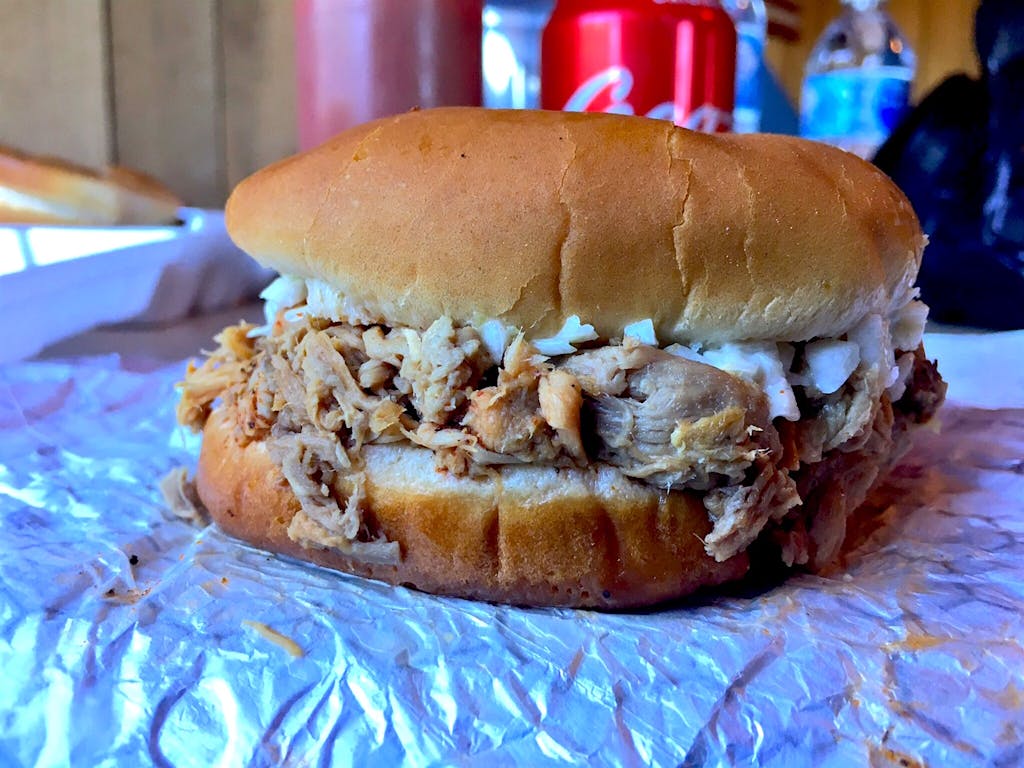
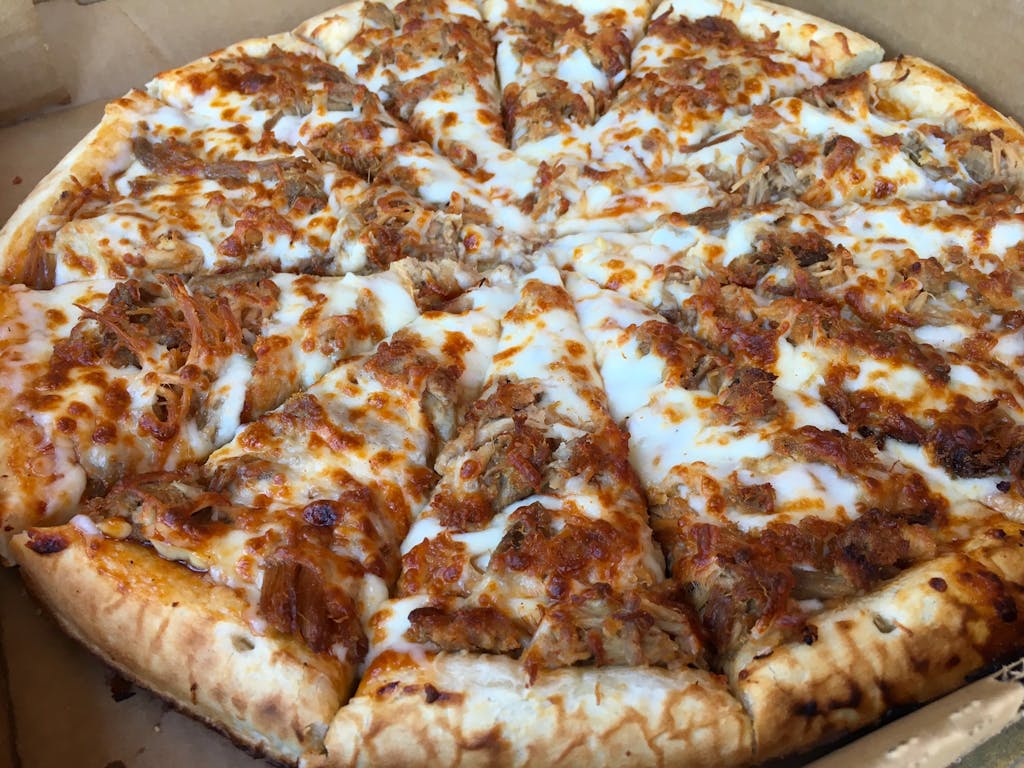
The whole hog from Ramey’s, both on a sandwich and by the pound, was fantastic. Even the pizza was better than expected. But Daryl and Phil both said it all of it would have been better a month earlier. They’ve recently had some issues with hogs that are too lean after low stock from their suppliers forced them to buy from other pig farmers who don’t keep their stock as fatty. Lean hogs are sadly the norm, thanks to the pork industry. That’s a whole other problem for another time, but it has a huge effect on how whole hogs are cooked. Liquid fat gathers at the center of the whole hog as it cooks and creates a faux confit situation, slowly cooking the pork in its own fat. When there’s not enough fat, the pork dries out. Daryl explained how he knows if the cooked hog is fatty enough:
I want to be able to take that meat up there out of that pan, and when I throw it down there I want to see fat. I wanna see oil. I wanna see grease on it. When I chop it, I want to take my cleaver and run that table to pick that grease up on the table and put it back on my barbecue.
Just to be test the metric, I had by box filled with middlins—the juicy strands of belly meat—when I grabbed a pound to-go.
With so few whole hog pitmasters left in West Tennessee, the prospect of it continuing seem dire, but there’s certainly hope. Zach Parker is just 25-years old, and is just as dedicated to whole hog cooking as his father. The younger generation of the Ramey family, Phil and Candice, are as involved in the business as their parents. In Nashville, Pat Martin makes as good a West Tennessee whole hog ambassador as you’ll find.
There’s another bright spot too. The rumor I’d heard repeatedly—that Southern Natural Farms (412 Meat Processing) was at full capacity with whole hogs—is apparently unfounded. Folks said there was no way to open a new whole hog joint because you couldn’t get the pigs processed. But after talking with their employee Jacob Simpson, that doesn’t seem to be the case. “We definitely have capacity,” he says. So make plans to get over to West Tennessee and try some of the whole hog barbecue. Maybe another pitmaster can be convinced to start buying their pigs whole by the time you get there.
Ramey’s Whole Hog BBQ
14 E Holley St.
Parsons, TN 38363
Open Thur-F 10-7, Sat 10-5
Scott’s Parker’s Bar-B-Q
10880 US-412
Lexington, TN 38351
Open Tues-F 9-6, Sat 9-4
Martin’s Bar-B-Que Joint
410 4th Ave S.
Nashville, TN 37201
Open Sun-Thur 11-10, F-St 11-midnight
*By using the word “barbecue,” places cooking whole hog in electric ovens do not qualify.


